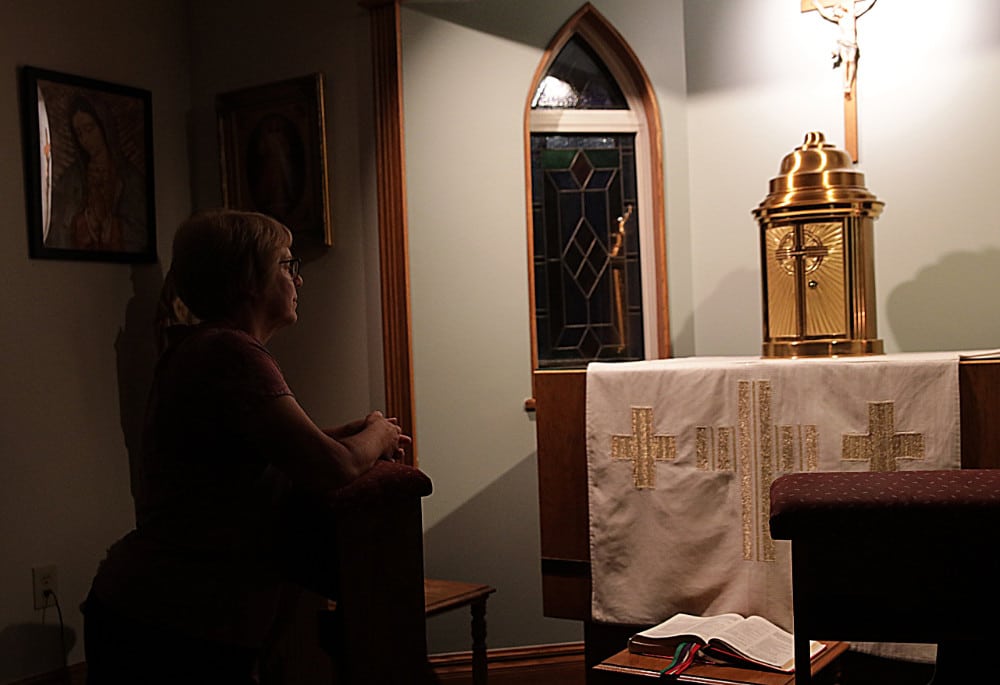 Insider, out. Outsider, in. That’s what the Gospel brings about, what Mary prophesied and Jesus preached: that the rich would be sent away empty, the mighty thrown down; that the last will be first and the first last (cf. Lk 1:52-53; Mt 20:16). It’s what Jesus lived, emptying himself, as Paul said (cf. Phil 2:7). It’s what he called his disciples to embrace; “take the lowest place,” the Lord taught (cf. Lk 14:10). This way of seeing, this reversal of valuation, belongs to the Gospel fundamentally; this turning of the tables, this humbling of the proud, it’s just what God does — this humble God humbling us.
Insider, out. Outsider, in. That’s what the Gospel brings about, what Mary prophesied and Jesus preached: that the rich would be sent away empty, the mighty thrown down; that the last will be first and the first last (cf. Lk 1:52-53; Mt 20:16). It’s what Jesus lived, emptying himself, as Paul said (cf. Phil 2:7). It’s what he called his disciples to embrace; “take the lowest place,” the Lord taught (cf. Lk 14:10). This way of seeing, this reversal of valuation, belongs to the Gospel fundamentally; this turning of the tables, this humbling of the proud, it’s just what God does — this humble God humbling us.
It’s what we see in John this week in the story of the woman at the well. A Samaritan, she is certainly an outsider: a woman, for starters, she’s also an allegedly immoral person, at the least a devotee of a twisted faith. She belongs to a people with whom good Jews had no association.
That’s why the woman was shocked by Jesus’s request: “How can you, a Jew, ask me, a Samaritan woman, for a drink?” (Jn 4:9) Conditioned by the prejudices and hatreds with which her world was constructed, it would take her awhile to recognize real love.
| March 12 – Third Sunday of Lent |
|---|
|
Ex 17:3-7 |
What she didn’t at first grasp is what John is trying to tell us, that the Gospel brings about this great reversal of valuation — insiders out and outsiders in. Before the story of the Samaritan woman, John tells us of Jesus’ encounter with Nicodemus. the consummate insider, a Pharisee, a “ruler of the Jews” (Jn 3:1). But he comes to Jesus under the cover of darkness; he never seems to get it, at least not publicly. The Samaritan woman, however, does; she goes back into town, shares her experience, bearing witness to Christ, and many begin to “believe in him because of the word of the woman” (Jn 4:28, 39).
Jesus does better among the Samaritans than he did among Jews in Jerusalem; their belief, he didn’t quite trust (cf. Jn 2:23-24). The contrast is just too obvious to be incidental. John is telling us about what God in Christ is doing: that this is all part of God’s great ingathering, what he promised first to Abraham, that in him all the peoples of the earth will find blessing, that his descendants, like the stars in the sky and the sands on the seashore, would be too many to count (cf. Gn 22:17). John’s trying to tell us the Gospel is for all of us — even Samaritans, even you and me.
But, of course, this love, this inclusion, doesn’t do away with the truth — any of it, not even hard truths. Which is the difference between the inclusion found in the Gospel and what the world usually calls inclusion. Jesus says some very hard things to the Samaritan woman. “You people worship what you do not understand; we worship what we understand, because salvation is from the Jews” (Jn 4:22). That was a harsh, insulting thing for a Samaritan to hear. He also honestly talked about her sin, and her past. If her five husbands are not merely an allegory (as Origen believed), if they’re real, then even by Samaritan standards, she’d lived her life well out of moral bounds. But Jesus doesn’t shy away from it, or politely ignores it. St. Augustine once said, “Hatred may use kind words, and love hard words.” That’s what we see Jesus doing, including all in God’s redemption but still speaking the truth. For that’s the actual purpose of inclusion — Christian inclusion, at least — truthful mercy leading to radical redemption; breaking the lie, finding the truth that sets free.
Which, I think, is the lesson, or, perhaps, more the challenge. Can we allow ourselves to be so welcomed and so convicted all at once? Would we let Jesus talk to us this way? Are we as strong as the Samaritan woman? And, can we speak like Jesus? Can we commit ourselves to seeking and loving others outside our comfortable communities, seeking those we’ve been conditioned to fear or dislike? Can we speak truth in love to them? What is the quality of our Catholic witness? All good questions for Lent, thirsty as we all are for living water, and not just us but them too. Whoever your them are.
Father Joshua J. Whitfield is pastor of St. Rita Catholic Community in Dallas and author of “The Crisis of Bad Preaching” (Ave Maria Press, $17.95) and other books.







